Including Two BTEC L3 Unit Certificates in the Legal & Practical Contexts Of Self-Defence and Risk Management And Assessment
And Here Are Just Some of The of The Benefits You Will Receive When You Do This Online Course ...

To Invest In This Awesome Course Choose One Of The Two Payment Options Below....
1 x Payment of £675 + Vat
3 x Payments of £225 + Vat
Here's The Problem ...
This Course Is The Solution And Has Helped These People ....
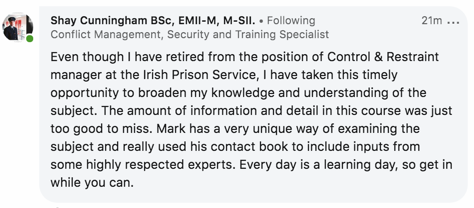
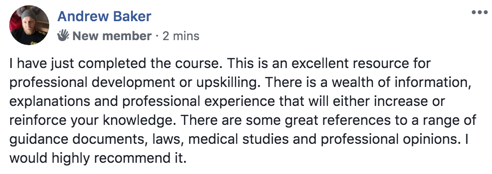
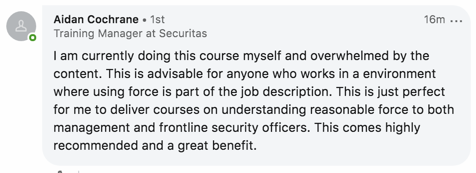



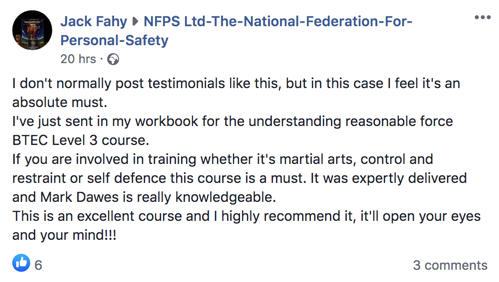
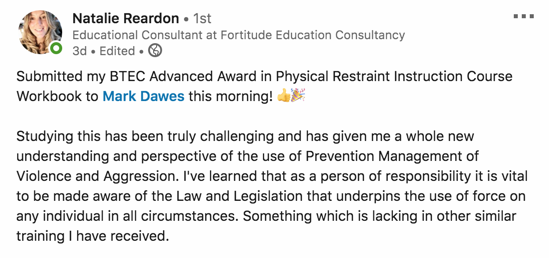

2 x BTEC Level 3 Unit Certificates With This Course!
This Training would be ideal for you if you are:
- Interested in knowing more about the laws that relate to the use of force;
- Responsible for the management of staff who use physical force in the workplace.
- The person responsible for investigating any use of force incident in the workplace.
- An Inspector responsible for inspecting organisations against their specific regulatory standards.
- Currently a Restraint Trainer who would like a recognised BTEC Unit Certificate in this area
What is Competence?
Here Are A Summary of The Benefits That You Will Receive When You Decide To Do This Course ...

Legally Accurate and Defensible You can be safe in the knowledge that the knowledge and information that you will receive is possibly the most legally accurate and defensible of it’s kind in the UK today, because you will learn about the law in relation to reasonable force from properly qualified, experienced and competent lawyers (including a Professor of Law and a KC).

Health & Safety Legislation: Learn about how Health & Safety legislation applies with regards to the use of force as well as an understanding of how the various elements of the Health and Safety At Work Act 1974 (and it statutory Regulations) apply when planning and delivering use of force training and in the strategic operational use of force, particularly in areas of safety, health, welfare and negligence.

Medical & Scientific: Learn about the medical implications of restraint and the scientific research into the risk of serious injury and death associated with physical restraint and how to reduce those risks from a properly qualified and competent medical professional and a scientist who has done leading research into restraint positional asphyxia.

BTEC Level 3 Unit Certificate 1: Gain a BTEC Level 3 Unit Certificate in the Legal & Practical Contexts Of Self-Defence. whilst gaining a broad and in-depth overview of UK statute and common law, with regard to the understanding or reasonable force. This is particularly important with regard to providing legally accurate instruction when providing use of force instruction and forms an important part of the instructors level of competence and underpinning professional knowledge

BTEC Level 3 Unit Certificate 2: Gain another BTEC Level 3 Unit Certificate in Risk Management & Assessment which includes demonstrating an understanding of how the various elements of Health and Safety legislations apply when planning and delivering use of force training and in the strategic operational use of force, particularly in areas of safety, health, welfare and negligence as well as the risk of serious injury and death associated with physical restraint and aims to provide guidance on how to reduce those risks.

Great Evidence of CPD: This course provides you with excellent CPD if you who need to evidence a certain number of CPD hours per year. We estimate that this course (due to the amount of content and value contained in it) equates to at least 40 hours of Continual Professional Development for you, so it is definitely worth doing.

100% No Quibble – Money Back Guarantee: If you are in any way disappointed or dissatisfied we guarantee to give you 100% of your investment back – no questions asked. Therefore, you have everything to gain and nothing to lose. We take all the risk for you.
FREE BONUS - NFPS Level 3 Risk Assessment Award Course Valued at £275 + Vat
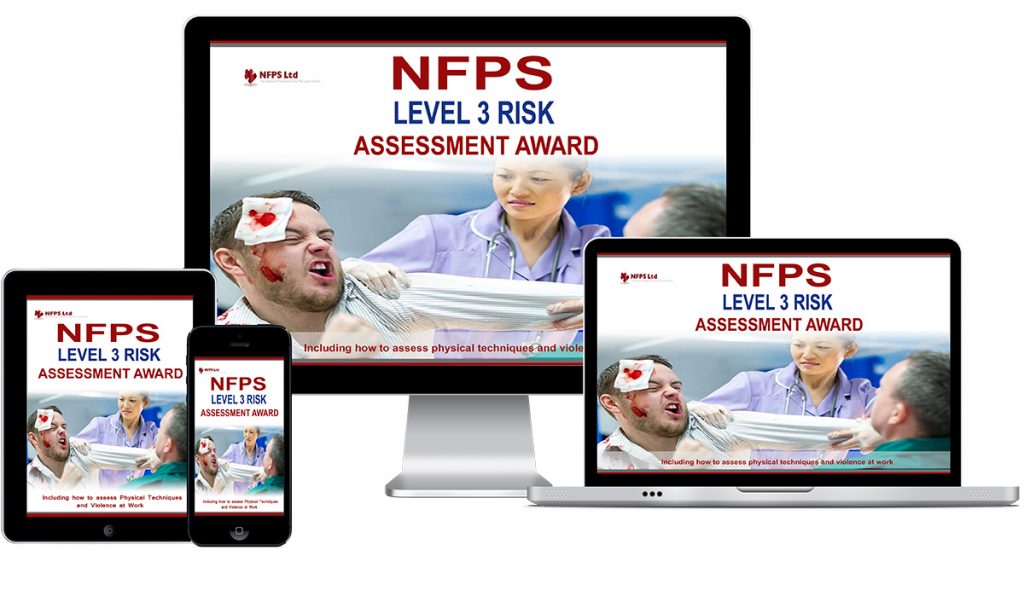
This course will take you through everything you need to know and do to produce risk assessments and at the end of the course when you submit your assessment, we will issue you with a NFPS Level 3 Risk Assessor Certificate of Competence which is your evidence that you are competent to do risk assessments because you have gone through a structured process of learning and development.
What Are The Drawbacks of Not Doing This Course?
By not doing this course you may not be able to evidence your understanding of this subject.
Cheaper Than A Lawyers Hourly Rate!
Your investment in this course is only £675 + vat and if you consider that an average lawyer charges between £300 – £500 an hour for their services you can work out for yourself how much this course is actually worth.
Want To Know What Others Think About Us and Our Training? Read these Comments Below - They All Can't Be Wrong!
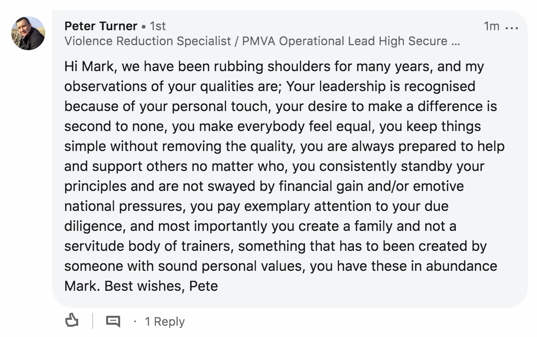
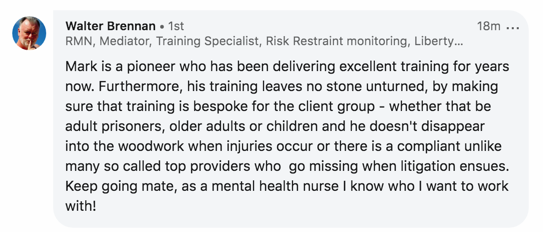
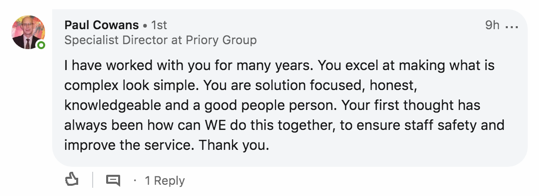

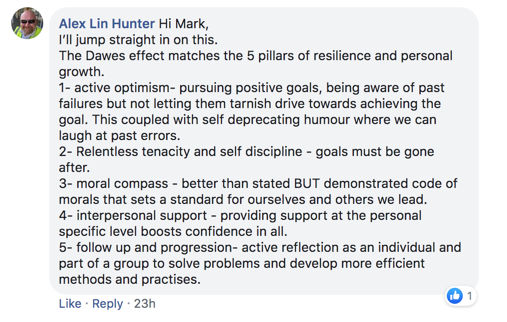








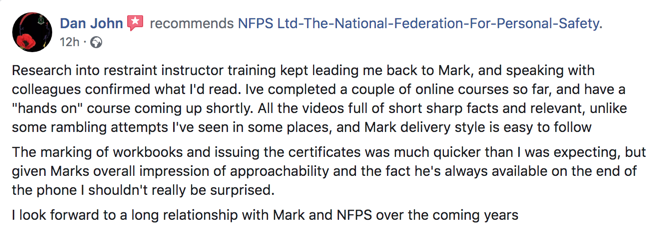
To Invest In This Awesome Course Choose One Of The Two Payment Options Below....
1 x Payment of £675 + Vat
3 x Payments of £225 + Vat

